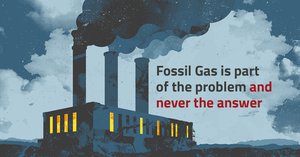After decades of misleading the public that fossil fuels aren’t that much of a problem, fossil fuel companies have realised that the truth is catching up with them. Seeing the stock prices of coal and oil plummet, they have increasingly moved their focus to natural gas – and have used their slick PR machines to promote it is as the cleaner, greener fuel of the future which will enable us to meet our climate goals.
There’s just one problem – it’s not true.
But natural gas is renewable, right?
No, natural gas is not renewable.
By marketing it as ‘natural’, fossil fuel companies conjure up images of sunlit green meadows full of charming woodland critters. However, ‘natural’ gas is only natural in the same way that coal and oil are – it naturally occurs within the Earth’s surface. That doesn’t mean it’s a good idea to pull it out and burn it.
It’s important to remember that gas is a fossil fuel – that’s why we prefer to call it ‘fossil gas’ rather than ‘natural gas’. Like any fossil fuel, gas is produced by a natural process which happens much slower (as in, millions of years slower) than we extract it.

Is natural gas low-carbon?
While burning natural gas does tend to produce lower carbon emissions than coal or oil, that does not mean it’s low-carbon. That’s because no fossil fuel can be low carbon.
The Intergovernmental Panel on Climate Change (IPCC) has stated that burning gas is the third most carbon-intensive method of generating electricity. So, for the same reason that you wouldn’t call the third tallest building in the world a ‘small’ building, natural gas is anything but ‘low’ carbon. In fact, in 2019, we successfully forced one major energy company to backtrack on their claims in their advertising that gas is low carbon.
What’s more, the fossil gas industry leaks methane into the atmosphere at almost every step in the supply chain. Methane is a greenhouse gas that is, in the short term, 86 times more potent than carbon dioxide and has also driven more than a quarter of global warming to date.
Can natural gas act as a ‘bridge fuel’?
Fossil fuel companies want us to believe that we need to extract more gas to fill the gap between decreasing coal and oil production and ramping up the production of more renewable forms of energy. However, this is disingenuous. Pushing fossil gas as a ‘bridge fuel’ is one of the biggest barriers to achieving the shift to renewable forms of energy.
Each unit of fossil gas that is extracted gets us further away from our climate goals. In order to achieve the Paris Agreement goal of keeping warming under 1.5°C – a goal scientists warn must be achieved to avoid the worst impacts of the climate crisis – gas production and consumption must drop by 40% worldwide over the next decade.

Can fossil gas be decarbonised?
Decarbonisation is a term you will increasingly hear from gas companies in response to their critics. They argue that we should keep using fossil gas and keep building infrastructure like pipelines because they can be used to produce and transport ‘renewable or low carbon gases’ like hydrogen or gas from crops or agricultural wastes.
The problem is decarbonised gas does not work. For example, if we want to use hydrogen as a source of energy, and that hydrogen is produced using fossil gas, we need to capture the carbon emitted by the gas for it to be decarbonized. But the technology needed to do this is unproven, eye-wateringly expensive and may only be able to provide a tiny amount of the energy that fossil gas currently does
Is hydrogen also a fossil fuel?
Hydrogen itself is not a fossil fuel. But the hydrogen that gas companies want to produce – called ‘blue hydrogen’ – is made by burning fossil gas. As a result, there is a good chance that using hydrogen will produce a lot of carbon.

Why are governments subsidising fossil gas?
Fossil fuel companies are putting heavy pressure on governments to stay present and relevant in the energy sector. For example, our report Pipe Down revealed how a group of gas companies are influencing the distribution of EU public money for their own climate-wrecking projects.
This influence means that, although the EU has committed to reducing its emissions to net zero, it is still spending billions of taxpayers’ money propping up unviable infrastructure projects for a fuel we can’t afford to burn.
We’re working to fight back against the influence of
powerful gas companies, end governments’ financial and policy support for the
fossil gas industry, and accelerate a global transition away from gas to
genuinely sustainable energy sources. If you’d like to stay up to date with the
latest news from our campaign, you can sign up for email
updates here.
Key numbers
- 30 percent: Amount by which Europe must reduce gas consumption by 2030 to meet the EU’s current climate targets.
- 40 percent: Amount by which global gas production and consumption must drop to achieve the Paris Agreement goal of keeping warming under 1.5°C , according to Global Witness’ 2019 investigation Overexposed.
- 50 percent: Portion of the increase in greenhouse gas emissions for which gas is responsible since 2016.
- More than half of all the new gas production in the world over the next decade is set to come from the US, more than four times more than the next largest producer, according to Rystad Energy.
- US gas exports are set to rise by 80% over the next decade, which would make the US the second largest gas exporter in the world, according to Rystad Energy.


